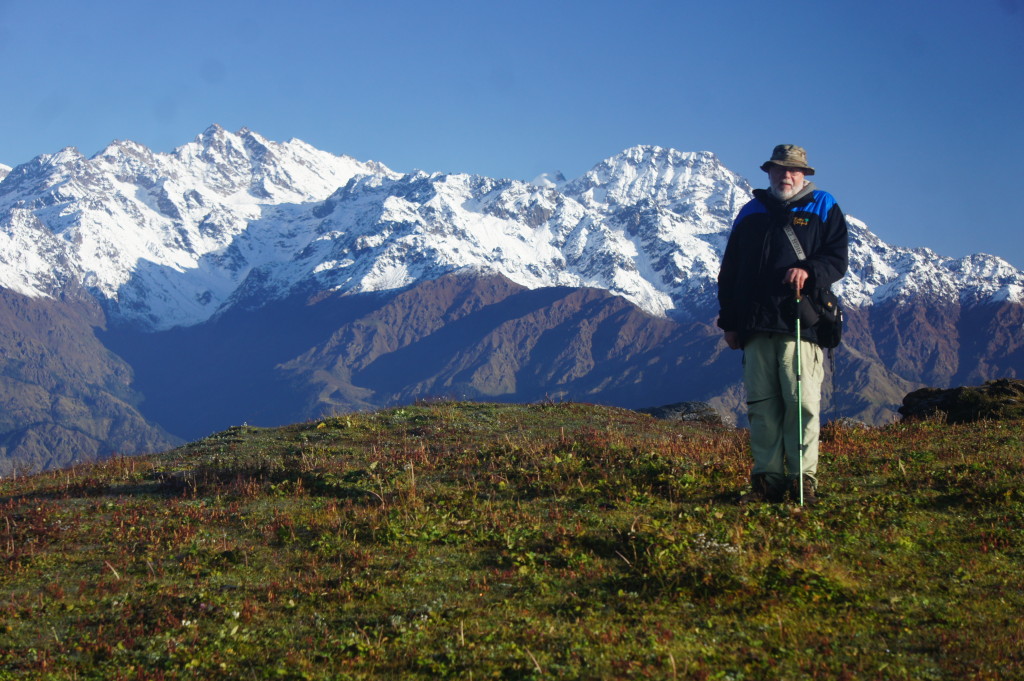Published on November 1, 2015 in the Singapore American Newspaper:
We’ve all seen the photos: the streets of Kathmandu flooded with rubble, the Nepalese families picking through the remains of their collapsed homes, the piles of bricks where Durbar Square used to be. But since the two earthquakes in April, which left over 8,700 dead and apparently shifted Mount Everest by three centimeters, Nepal has been steadily rebuilding.
A United Methodist Pastor in the Detroit Conference who has lived in Nepal for the past few years, Rev. Dr. Jan L. Beaderstadt has been actively involved in the disaster recovery and has been working with Renaissance Outreach Ministries to raise aid money for those living in the mountains, which were some of the hardest hit areas. He recently traveled to Tinmane Village in the Gorkha District to distribute tents to families who lost their homes.
“I am impressed with the attitude of the people,” he commented in an interview. “They have pulled together to help each other. There has been very little in the way of looting. Even though the government has been slow in getting aid to the people who need it, the people haven’t resorted to violence like they would have in other developing countries. Nepalis are patient people.”
If you’ve been wondering how you could best support Nepal’s efforts to reconstruct, the answer is fairly straightforward according to Dr. Beaderstadt: book a trip. Half a million people in Nepal work in tourism and it’s a crucial pillar of the impoverished nation’s economy. While aid is helpful, tourist dollars are a much-needed source of funds to keep the nations on a steady path to recovery. If you’re worried about safety, know that the has lifted travel warnings for most areas. The photos, though dramatic, are hardly the whole story. Most of the country was unaffected by the 7.8 magnitude earthquake, with only 14 out of 75 districts suffering damage. Almost all national parks and protected areas, including UNESCO heritage sites and popular trekking destinations.
Walking around Kathmandu with Dr. Beaderstadt was like being escorted by the mayor. Every few minutes he called out jovial greetings and shook hands with those he knew, from trishaw drivers to shop owners.
“You never run out of new thing to try in Kathmandu,” he declared before leading us into a restaurant posted with a sign that read ‘Probably the Best Pizza in Town.’ Inside, he immediately launched into a long conversation with the head waiter, apparently an old friend. We had met Dr. Beaderstadt a few days earlier in Nagarkot, just after my husband and I had trekked 18 kilometers through the mountainous Nepalese countryside, a section of the Kathmandu valley that the earthquakes devastated.
He mused that the earthquakes may prove to be a blessing in disguise, as the disaster has given people of all castes and religions something to rally around. In addition to long held social and ethnic hierarchies, the recent transition from monarchy to democracy has not been an easy one. The king relinquished sovereign power in 2006 and although elections were carried out relatively peacefully, quagmire-inducing political tensions and power struggles continue. Regardless, “for the most part, life goes on even when government is almost non-functioning at times. The people here demonstrate that they can function as a highly civilized society even if the country [has taken nearly a decade to draft] a constitution.”
While many expats hold themselves separate from the communities they reside in, since leaving American soil in 1998 Dr. Beaderstadt has enmeshed himself wholeheartedly in every new environment. While running a Bible School in Bangladesh and making frequent visits to Kathmandu, he was approached by his current partner, Kul Bahadur Gurung of Alliance Treks & Expeditions. Together they co-founded the Be-Kul Language Training Center to conduct leadership, management and English language training for local businesses. Though Dr. Beaderstadt noted that dealing with bureaucracy, particularly navigating the expectation of bribes, was one of the greatest challenges of living in Nepal.
“The people are wonderful, although lousy time managers,” he said. “Everything gets done by ‘tomorrow’ but tomorrow never seems to come. We often have severe power cuts that can last up to 11 hours a day. You often don’t have water on demand. But you get used to it, learn to plan ahead (they publish a daily power outage schedule) and learn to take life a bit easier.”
In spite of the unpredictable availability of amenities and the impending task of reconstruction, Dr. Beaderstadt has no plans to leave Nepal any time soon and is anticipating the arrival of his wife after she retires in a few years.
“Those living here get a chance to really immerse themselves in the local culture and make some really good friends. It is a relaxed atmosphere. I love it here.”

